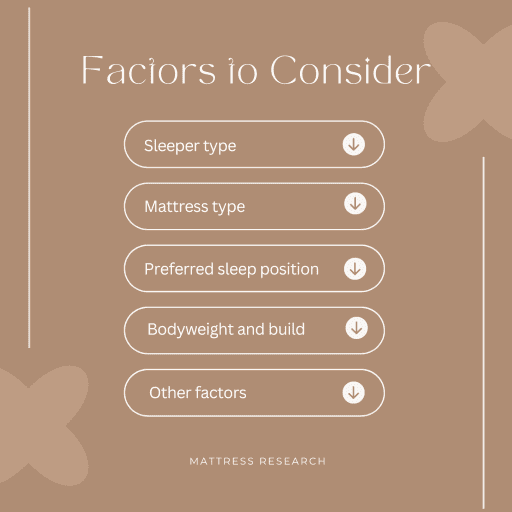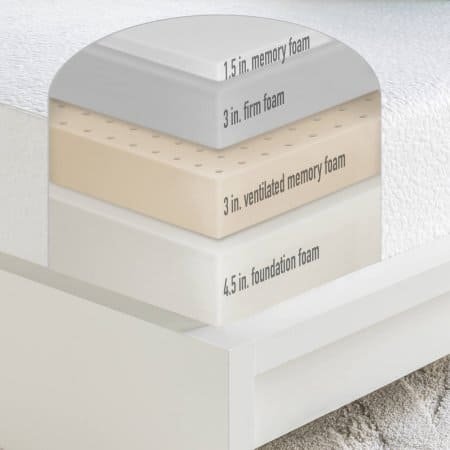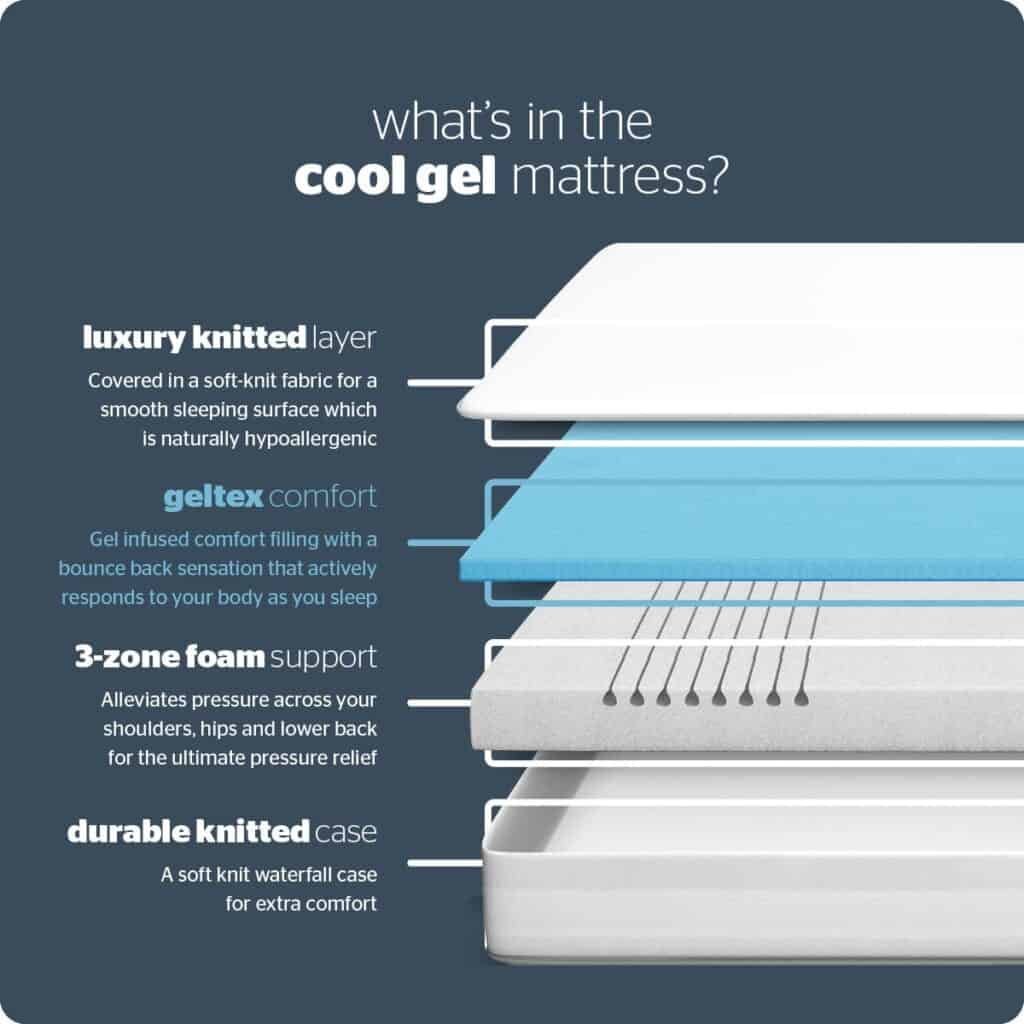What Mattress Firmness is Right for Me?
The first step in finding the best mattress is to realize that your preference for firmness and softness may not be as set in stone as you think. Many people who think they want an incredibly soft mattress will find that a medium-firm is better because it relieves pressure points while supporting the body’s natural curves and alignment. If this sounds like you (or if you’re willing to keep an open mind), it’s best to test out mattresses made of different materials before you buy. You can do this at any bedding store, but remember that some salesmen may steer you toward their most expensive product if they sense you’re unsure about what you want.
Positional Preferences
When choosing the firmness level of your mattress, it’s essential to consider what position you like to sleep in. A good rule of thumb is that back and stomach sleepers prefer something firmer, while side sleepers need something softer so they don’t feel pressure on their shoulders and hips. Combination sleepers can follow either guideline depending on how often they find themselves in each position.
- Back Sleepers: A medium-firm mattress is a better support system for the spine, neck, and lower back for those who prefer sleeping on their backs. Too soft a mattress or too many pillows could make your head tilt down or backward when lying flat.
- Side Sleepers: Soft mattresses are best for sleeping on their sides because they allow the body weight to be distributed more evenly. Otherwise, there will probably be added pressure exerted onto the shoulders and hips from being supported by a hard surface which can lead to pain in those areas.
- Stomach Sleepers: People who love sleeping on their stomachs usually prefer firmer mattresses because soft mattresses can cause strain in the lower back and neck due to sinking too much into them. This also goes back (no pun intended) to keep one’s spine aligned while lying down.
- Combination Sleepers: If you’re someone who changes positions throughout the night, then it would be best to go with your dominant position, whether that be side, stomach, or back. The same rules apply here as above concerning the natural alignment of your spine and preventing pressure points from forming during restful slumber.

Your Body Size and Weight
Your size and weight are two of the most important factors to consider when determining what firmness level is right for you. Typically, the heavier you are, the more support you’ll need from a mattress. And conversely, the lighter you are, the softer a mattress can be while offering proper support.
Larger people should opt for firmer mattresses that offer plenty of support to keep their spines aligned adequately with their heads and hips. Medium-firm or firm mattresses help prevent excessive sinkage that can put your spine in an unnatural position. A softer mattress may work better for smaller people since they don’t exert as much pressure on a bed as larger sleepers. A lighter person won’t likely feel uncomfortable bottoming out on a soft or medium-soft mattress because they don’t weigh enough to compress these beds very much.
Personal Preferences for Soft or Firm Mattresses
There’s no right or wrong answer to the softness of your mattress, but it’s wise to consider what you like. People who want to sink into their mattresses tend to prefer softer mattresses. For example, side sleepers often need medium-soft mattresses so their hips and shoulders sink into the bed properly. Medium-firm mattresses are suitable for back sleepers because they keep the body aligned and in a neutral position. Stomach sleepers should look for a medium-firm or firm mattress that prevents their hips from sinking too much into the mattress.
Various factors go into determining the firmness level of a mattress that’s best for you. You should consider this before purchasing a mattress, but it’s essential if you’re shopping online (without laying down on the mattress first).
To help you find a mattress with the proper firmness level for you, keep in mind the following factors:
- Sleeper type. Consider your sleep style, preferences, and needs. For example, stomach sleepers need firmer mattresses to support their midsections better and align their spines properly. On the other hand, side sleepers need softer mattresses to cushion their shoulders, hips, and knees — these are all pressure points for side sleepers that can cause aches and pains without adequate cushioning.
- Mattress type. Most all-foam mattresses are medium-firm or medium in firmness since memory foam cradles the body so well without needing an overly soft or firm surface. Innerspring mattresses tend to be firmer overall since they rely on springs for support. Because hybrid mattresses combine both support systems, they can have a wide range of firmnesses depending on how much foam is used compared to spring coils in the mattress construction.
- Preferred sleep position(s). If you change sleeping positions frequently throughout the night or if you like to get cosy by curling up into a ball when falling asleep, then consider getting a softer mattress or one with zoned comfort layers that provide extra cushioning where your shoulders and hips press into the bed when you’re curled up sleeping on your side. If, instead, you tend to stick primarily with one position throughout the night and tend to stretch out when sleeping on your sides (rather than curl up), then go with a firmer option if you’re a side sleeper, as soft beds can lead to spinal misalignment in this case. At the same time, firmer beds provide better hip alignment for back pain relief among back sleepers who prefer not sinking too far into the bed — such as heavier individuals who weigh over 230 pounds.
- Bodyweight and build. If you’re between these two weight categories, you have more leeway regarding mattress firmness. Heavier sleepers (weighing over 230 pounds) tend to do better on firmer mattresses since they sink deeper into softer mattresses, which can cause the hips to dip and the spine to misalign. Lighter sleepers (weighing under 130 pounds) often prefer softer mattresses as they don’t sink in as deeply and may feel like firmer options are too hard.
- Other factors. If you’re pregnant, have chronic pain, or are recovering from an injury, you may need a softer mattress for added pressure relief. If you have a partner who moves around a lot or gets in and out of bed frequently throughout the night, you may want to consider a mattress with little to no motion transfer so you’re not disturbed by their movements. If you sleep hot, look for a mattress with cooling properties to help you sleep more comfortably.

Here are the different types of firmnesses of mattresses:
- Extra soft: Less than a three on the firmness scale.
- Soft: Three to four on the firmness scale.
- Medium: Five to six on the firmness scale.
- Medium-firm: Seven to eight on the firmness scale.
- Firm: Nine to ten on the firmness scale.
- Extra-firm: More than a ten on the firmness scale.

Why do you need to pay close attention to mattress firmness?
The main reason to focus on firmness is that it’s the number one factor influencing your comfort on a mattress. If a mattress is too hard, it can feel like you’re sleeping on a board and also cause back pain. If a bed is too soft, you may sink in too much and have difficulty properly aligning your spine, leading to back pain.
How do you know what firmness is right for you?
The best way to find out is to lie down on a mattress in-store or order a mattress online that allows you to try it out in your home for at least 30 days with a sleep trial. This will give you enough time to see how the mattress feels and if it leads to any pain or discomfort. If you’re still unsure, consider getting a mattress with adjustable firmness levels so you can change the level of support as needed.
What if you and your partner have different firmness preferences?
If you and your partner can’t agree on a single firmness, you may want to consider getting a mattress with adjustable firmness levels to adjust the level of support to your liking. You may also want to consider getting a mattress with different firmness levels on each side — known as a dual-firmness mattress — so you can each sleep on the firmness that’s right for you.
Final Thoughts
Mattress firmness is an essential factor to consider when shopping for a new mattress, as it can significantly impact your comfort and quality of sleep. Be sure to take your time when choosing a mattress and pay close attention to firmness levels to find the perfect one.
Choosing the right mattress firmness is essential as it can impact your comfort and quality of sleep. Be sure to take your time when selecting a mattress and pay close attention to firmness levels to find the perfect one. If you’re unsure of what firmness is right for you, consider getting a mattress with adjustable firmness levels or a dual-firmness mattress so you and your partner can each sleep on the level of support that’s right for you.



